#literally most of the major characters are queer
Explore tagged Tumblr posts
Text
Of course I don't think that every person who plays dishonored is queer. However, it must be noted that dishonored is a very queer game.
#literally most of the major characters are queer#all four playable characters are queer#its very nice
9 notes
·
View notes
Text
Call me homophobic, but I don't actually think it's great representation to stick a complex, dynamic, newly-realized bisexual character permanently with a flat, boring, underdeveloped love interest just because that was the first guy who showed interest.
#in my hater era#like what you like#but goddamn#the argument that this is somehow outstanding queer representation is baffling#they have had 13 episodes to DO something with this character and they have chosen not to#no development anywhere#even though they literally brought him back so there is built-in background ripe for the picking#and yet#anti bucktommy#anti tommy kinard#the saddest part is#i don't even hate him#he's not important enough to hate#there is just absolutely nothing to him#and that's sad because whether or not he was intended to be long-term or endgame#the writers are better than this and the character SHOULD have SOME development#like why are we all swooning over 911 shoehorning in a returning character to tell a bi buck story#but treating that character like the most expendable love interest in history#i don't like him but actually i think queer characters#and especially ones who are part of such a major later-in-life bisexual realization storyline for a beloved main#deserve a little more respect than what 911 has been giving him#anyway#might delete later i don't know#also i need to stop looking at the 911 subreddit#worst takes i've ever seen that place is a cesspool
309 notes
·
View notes
Text
i genuinely think that the shift from the old marauders to the new one where every straight ship even the canon and most important one (i.e jily) and that whole jegulus/all the other made up ships that make no sense come from a place of fetish. yall LOVE to turn characters into little stereotypes and that whole constant obsession w homosexuality is not helping any cause. most of view view homosexual/queer relationships as more angsty or interesting in a way that’s so strange to me. ships could follow the most standard plot line but still be considered angsty cus they’re queer and why is that? this fandom has taken such a strange turn.
you are making sexuality such a strong and central point in a character importance more than any other trait of their character. and those head canons just end up erasing the most important things about these characters
james potter was a strong and good man. he developed from his arrogant teenage self into a good man fighting for a good cause. but now you made him into a twink that is in love with a death eater/ a member of the family that abused his best friend all his life. james and sirius’s relationship was a central point of their characters. and james’s love for lily is a central point as well??????
sirius being turned into a overly feminine gay drama queen, even though what WAS important about him was his loyalty his strength and his honor??? but all of that was forgotten. HE CAN BE GAY WITHOUT ERASING HIS ORIGINAL PERSONALITY. stop painting him into a stereotype of a gay man.
regulus black is getting the recognition that is to be given to sirius. his character was not some brave rebel vigilante that fought for justice. he was a pureblood supremacist.he was a deatheater. yes he is important to the story but he was not what you made him.
lily evans is the most important character of the series. she’s the reason it exists. her and james’s love is the center point. but it was pushed away by you people to focus on your strange fetishized view of gay men. this MAJOR character whose love for her son and husband literally MADE the story got cast away as a secondary character.
important topics like sirius’sabusive family, lily and james’s courage and love….was remplaced by ridiculized view of characters
make characters gay cus we don’t know anything about them yes okay that’s why wolf star was a major part of the fandom. but the complete shift of every single characters identity is just bullshit.
#the maraunders map#marauders#marauders incorrect quotes#marauders fandom#the marauders#ihatejegulus#jegulusisstupid#jily week 2022#atyd jily#jily fluff#jily incorrect quotes#jily fandom#jily fanfiction#jily#jily fanart#jily fic#jily microfic#jily headcanon#jilypad#jily au#pro jily#anti jegulus#anti jegulily#wolfstar#james sirius potter#james & peter & remus & sirius#sirius being sirius#remus loves sirius#sirius and regulus#sirius x lupin
762 notes
·
View notes
Text
Blurred Lines: Agency and Victimhood in Gothic Horror
Seeing as Robert Eggers' Nosferatu has just breached a cool $135M at the worldwide box office, it might be as good a time to talk about this as any. I believe I echo the sentiments of most diehard fans of gothic horror when I say this: while we are glad to see this masterpiece meet with well-deserved success, these numbers also mean that a significant proportion of its audience has been previously unfamiliar with the hallmarks of our beloved genre; and the resulting disconnect between the viewers and the source material has been the driving force behind the great majority of the online discourse that surrounds it.
The tools and conventions of the gothic, as a genre, are essential to Nosferatu's primary narrative arc. Its central character, Ellen Hutter, cannot be discussed outside of her literary context. Textually, she balances between heroine and damsel in distress - blurred, in many ways, from mainstream understanding.
That is done entirely on purpose. There are numerous reasons for it; I could go into heavy detail about it; and I will - under the cut, of course.
The main thing I must make absolutely clear (before delving any deeper) is that the gothic genre is fundamentally non-literal. It deals heavily in metaphor, allegory, allusion, obfuscation - and, indeed, the blurred lines that have recently caused so much controversy online. This is by design. It is not a flaw of storytelling or interpretation. The gothic affronts the rigid, black-and-white, mainstream forms of morality because that is what it has always been designed to do; and the newer installments like Nosferatu do the same, being built upon those traditional foundations.
The historical background is therefore essential to the understanding of a gothic narrative. In this, the film does provide the viewer with a relatively easy starting point; its period setting amplifies its connection to its predecessors, as well as the societal pressures and systemic violence that it aims to challenge. It allows the audience to perceive the story through a historical lens that comes pre-installed, as a sort of short-cut to the genre's original social context.
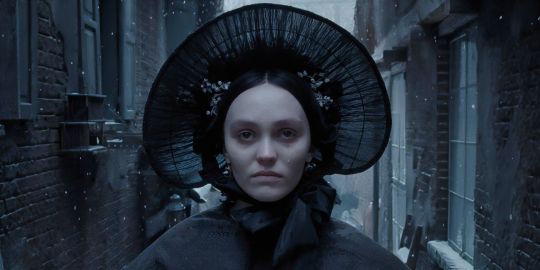
The context, in this case, consists of misogyny, queerphobia, xenophobia, and ableism - which, while rampant even in the modern day, were that much more blatant in 1830s German Confederation, where/when the story largely takes place. Every human character, regardless of who they are, is influenced by these oppressive aspects of their society; and Ellen Hutter is hopelessly entrapped within all four.
Her social situation, as we are given to understand, is precarious. Though she was originally born into wealth, she married down to escape her abusive father. She is an eccentric - her "wild" inclinations (such as having a sense of dignity or loving the outdoors as a child) are enough to cause almost vitriolic disapproval; but on top of that, she was born with a psychic gift, which manifests in a way that is not dissimilar from a mental (and sometimes physical) disability. She and her husband are also English immigrants, and thus perpetual outsiders in Wisborg (this is also one of the reasons Thomas is so anxious to prove himself at Knock's firm, and so keen to emulate Harding in all things); and, finally, she implied to experience queer attraction - which, though non-explicit, repressed, and never truly indulged, still affects her and the way she is continuously treated throughout the film.
Overall, Ellen's existence is perceived, at best, as an inconvenience - and at worst, a scandal. With that, she fits seamlessly into her story's genre.
The "immoral," the forbidden, the taboo is a cornerstone of all gothic fiction. It exists in the doubt between light and dark, harm and desire, love and abuse. It is the domain of sympathetic villains (e.g. Heathcliff, Wuthering Heights), of imperfect victims (Bertha Mason, Jane Eyre), of heroes who are deeply flawed, who cause their own tragedies, and often fail to save anyone at all (Victor Frankenstein, Frankenstein). Within the gothic genre, there are no absolutes; and its contradicting balance of dichotomies provides a reference point - or, more accurately, a cultural triangulation - for exploring the same complexities that a binary puritanical mindset strives to eradicate. These include sexual desire, female autonomy, physical and mental disabilities, classism; in short, anything that gets people wincing.
The popular discussion of these topics is frequently cruel, often avoidant, and rarely straightforward or productive. As stated above, it makes people uncomfortable. It's not pleasant. However, for Ellen (and many people in the real world), it is, quite literally, impossible to avoid. It defines every aspect of her daily life.
What this means for her and for the story is that within a narrative that refuses to gloss over the imperfections of her surrounding society, her victimhood is not thrust upon her by a shadowy figure, emerging from the night. Instead, she is a victim - of an ongoing and systemic, rather than individual, abuse.
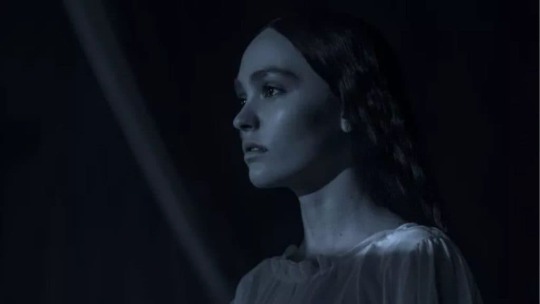
This aspect of Ellen's characterization lies at the core of her behaviour throughout the film. She is an unstable chimera of Brontë's Jane Eyre and Bertha Mason - in the sense that her actions are informed, in great part, by her acute awareness of her own disenfranchisement. She alternates between anguished raving and phlegmatic practicality, used to her pain but unable to entirely ignore it; and, the same way that Jane sees all the rage she feels (but cannot afford to express) manifested in Bertha, Ellen finds her counterpart in Orlok.
This is where the ambiguity begins.
Even though Orlok is most certainly a gothic villain, his relationship with Ellen cannot be interpreted as strictly adversarial. Naturally, it would be easy to ascribe their dynamic to grooming and PTSD; however, as previously mentioned, a gothic narrative is never surface-level - and the film itself never furnishes any information that would definitively limit it to that.
Firstly, to get the primary discourse point out of the way - yes, when Ellen and Orlok first meet within the ether, she is indeed young; and later, she is said to have been a child. However, at the time, the term "teenager"did not yet exist; Ellen's younger self is not portrayed by a child actress; and later, in 1838, she is referred to as a child multiple times - despite being an adult, married woman. Overall, within the film, the term is more often used to describe innocence and inexperience, rather than age; and her initial age is never specified. Granted, a multi-century age gap is not exactly "healthy" anyway - but this is a vampire story. It is per the course; and it complicates their relationship beyond a simple victim vs abuser narrative.
Secondly - and perhaps, most importantly - the overall impact of Orlok's coercion tactics falls flat in comparison to Ellen's human-world alternatives. Yes, he argues and threatens; but her social circumstances have never allowed her agency in the first place. Her father abuses, isolates, and threatens to institutionalize her; Thomas dismisses her concerns as "childish fantasies"; Harding and Sievers tie her down and drug her; Harding again kicks her out of the house. Her marriage, her friendships, are therefore all transactional; they grant her an escape from her father's house, relative financial stability, social support - on the condition that she represses her true self, pretends to be normal, doesn't threaten anyone's masculinity or heterosexuality, and acts like she's happy to be a deferring, obedient, settled wife. Being a daughter of a landed gentleman, she would never have been given a working woman's education, and evidently has no income of her own; and so, she has no options except to upkeep her end of the bargain - which means that her continued survival within mainstream society relies on constant background coercion.
Compared to this mundane, socially acceptable horror of her existence, the vampire actually offers her more autonomy than she is ever otherwise accorded. The terms of his covenant never threaten Ellen's own well-being; so on one hand, she has benevolence - and on the other, the dignity of choice.
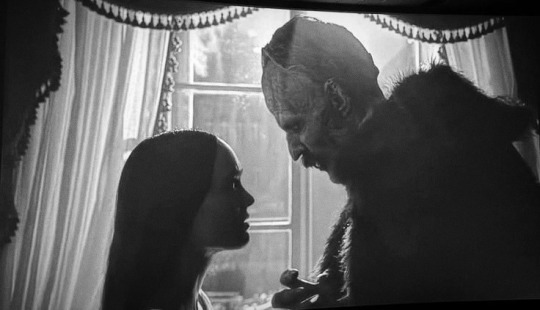
This contrast lies at the heart of her dilemma. Ellen is torn between what she believes she should be and what she knows - and Orlok knows - she is.
One is "correct," moral, Good; the other is "wrong," sinful, Evil. However, at the same time, the first is manufactured; it is artificially designed, and must be continuously enforced. The second is primal. Natural. In accordance with gothic tradition, the appeal of Orlok is that he is forbidden, yet instinctive. By design, he is a reflection of everything that Ellen is forced to repress on a daily basis. That includes her rage, her ostracism, her abnormalities; but also, her desperate need to be respected, understood, and desired. He is both grotesque and alluring, both a lord and a beast, both cruel and reverent.
"He is my melancholy!.." cries Ellen.
"I am Heathcliff!" whispers Cathy.
Still, while Cathy and Heathcliff are primarily divided by class and racism, Orlok and Ellen are separated by moral considerations. In the explicit sense, Ellen cannot choose the Evil that Orlok represents. Within the surface narrative, she is obligated by her society, her morals, and the story to choose Good - in this case, by nobly sacrificing her individual expendable life to save her husband and a city full of people. Her primary storyline, like everything else, has already been decided for her.
For the Trekkies among us, this is Ellen's own Kobayashi Maru. A no-win scenario. As such, within the context of character analysis, her destination does not matter as much as the little things she does along the way; and it is no accident that, as the film progresses, the subtler, seemingly insignificant choices she makes within that framework just happen to bring her closer - and closer - to Orlok.
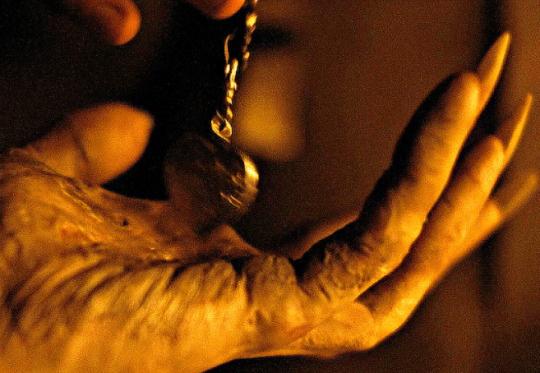
All of them are just innocuous enough to almost pass. She places a lock of perfumed hair in a locket that she gives to Thomas - and upon his arrival to the Carpathians, the same locket is immediately claimed by Orlok, who recognizes the scent of lilacs. Before making her sacrifice, she puts on her wedding dress and finds a bouquet of the same flowers - which is the sort of effort she didn't have to perform, especially given that he cannot resist her blood regardless. When Orlok arrives, she chooses to undress them both, and leads him to the bed, even though her previous sex scene with Thomas was entirely clothed; and in the morning, she pulls him close and holds him through the sunrise - even though he was already dying, and would not be able to escape. There was no need for her to touch his rotting flesh at that point, much less caress it.
There can be a "moral" explanation for all these actions; but the lack of direct obligation involved in them becomes increasingly blatant over the course of the story, and the doubt festers.
This sort of lingering ambiguity is precisely where gothic horror thrives - and intersects, scandalously, with romance. Gothic horror, much like bodice-ripper novels, noir thrillers, or "dark romance," builds much of its romantic intensity on the dichotomy of shame and desire. Imagine it, if you will, as a loom; warp and weft. It may even be described as literary BDSM - a continuous, mutually-agreed-upon act of roleplay between the author and their audience, and sometimes the characters themselves (though that depends). The point is to create an outlet for female, queer, or disabled sexualities, all of which are still heavily medicalized and restricted, derided, or denied entirely; and within these often intersecting genres, the violent or coercive intensity of the dominant lead (be it a vampire, a mafia don, or simply a more experienced lesbian) provides their repressed, seemingly passive counterpart an excuse to act upon their demonized erotic urges.
Between the page and the mind, everything that normally complicates a romantic or sexual encounter in the real world (subliminal hints, aggression, repressed and involuntary responses) becomes set dressing - serving to place a particular scene or dynamic within its fictional universe. The resulting Watsonian uncertainty is, naturally, part of the appeal. It is what allows the viewer/reader/listener a sincere emotional and sensual immersion; and for Ellen and Orlok, it provides an appropriately dramatic pretext for a night of tender vampire sex.
The discourse around their joining is painfully similar to the same that drifts around online every winter - in regards to the classic holiday hit, Baby it's Cold Outside. The song, written during an era in which extramarital sexuality was heavily restricted, follows a couple brainstorming excuses for the lady to stay the night; this intention was explicitly stated by both members of the original duet; but that hasn't stopped thousands of people from interpreting it as a "rape anthem." It is unsurprising, then, that an element of horror (guilt, shame, repression, coercion) muddles the water even further.
It's oddly apt, considering that the film premiered on Christmas Day.
Granted, I am not denying that there is an abusive aspect to Ellen and Orlok's connection, romantic or otherwise. However, to reduce Ellen to merely his "victim" is extremely inaccurate to her actual portrayal - because, within the framework of the film, her interactions with Orlok are the few in which she is actually able to exercise some form of agency. She never defers to him, their wedding-death hinges on her free will, as coerced as it may appear; and, in a fascinating subversion of a popular vampire trope, she is the one who summons him.
In gothic media, "Come to me!.." is invariably spoken by a vampire (or a vampire derivative like Erik, Leroux's titular Phantom of the Opera); their counterpart follows helplessly, without question; and giving these lines to Ellen is a dramatic deviation from tradition that fundamentally alters the underlying context of their power balance. By maintaining this call-and-response dynamic throughout the story, Eggers asserts that Ellen isn't helpless; and neither is she "in over her head." She is intelligent, powerful, and she has a tangible influence over Orlok, who is her only equal - which is why, ultimately, she is the one deciding where that relationship is headed.
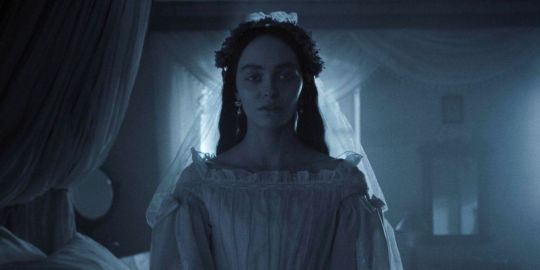
That is not to say that any alternative readings of the film are entirely incorrect. As I have stated above, the abusive/toxic narrative is definitely present, and even essential, in gothic media. On the Doylist level, it is the equivalent of a whip, or a solid pair of cuffs - essentially, a divestment of responsibility; though, to continue the metaphor, not everyone shares the same kink - and those who do might not all enjoy it the same way, so there's definitely significant variation. What I am trying to say, however, is that each story does come with a central conflict; and Ellen Hutter's victimization - much like Jane Eyre's, like Thomasin's (The Witch, 2015) - is systemic.
She is ostracized, disrespected - infantilized if her oppressors are feeling benevolent, demonized when they are inconvenienced - and still expected to always prioritize her husband/friends/community by default, regardless of how she is treated by them. Her surrounding society, morality, religion, culture all insist upon the same; and this is why, despite knowing that she has done nothing wrong by following her nature, she carries an enormous amount of guilt in regards to those "unacceptable" aspects of herself. It is also the same reason why Orlok - the sensual, cruel, utterly devoted monster - is the answer to her lonely call; and the reason why everyone around her is so eager to see her as his victim, rather than a victim of anything they may have perpetrated themselves. Ellen's is a rich complexity, fed upon centuries' worth of gothic tradition, and she cannot be forced into a flat, genre-inappropriate simplification.
Like The Witch, like NBC Hannibal, like Interview With the Vampire before it - Nosferatu (2024) is a story of self-indulgence being so unfamiliar that it feels like a sin; or, like dying.
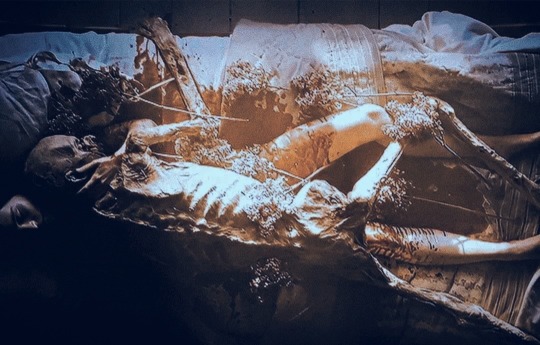
I, for one, would not deny her that.
#nosferatu#nosferatu 2024#nosferatu (2024)#ellen hutter#count orlok#lily rose depp#bill skarsgård#robert eggers#nosferatu movie#robert eggers nosferatu#nosferatu meta#ellenorlok#ellen x orlok#gothic fiction#gothic horror#gothic romance#horror film#horror film analysis#gothic art#wuthering heights#jane eyre#frankenstein#gothic film#vampire#vampires#vampire fiction#vampire movies
249 notes
·
View notes
Note
i am always surprised WoD doesnt get more love on tumblr. Its got literally everything tumblr wants. Gay vampire and where wolf, queer metaphors, and the whole setting is about playing as the outcasts and monsters. Not to mention the punk influence of the franchise. Like yeah WoD has its misses and issues but so does DnD and that didnt stop tumblr from treating DnD as the best and most progressive thing ever
Yeah, like I'm endlessly nostalgic for late 90s and early 2000s WoD even though it has aged very poorly in most places! And the cool thing about WoD is that it actually does, as a game line, support multiple different themes and vibes, as opposed to D&D which is quite singular in its focus: you have Vampire for basically playing undead mafiosi, you have Werewolf for actually fighting the power and raging against the machine (to an extent), you have Mage for the philosophy major, Changeling if you want to deal with themes of the loss of innocence and the power of stories, and Wraith if you're depressed!
And as said, WoD isn't perfect, but neither is D&D, and WoD is actually like perfectly unhinged for that side of Tumblr that loves posting about absolutely bonkers lore. Like, so many characters from WoD are perfectly blorboable! I want to see really stupid Tumblr discourse about the Brujah's noble Carthaginian experiment!!!
Anyway yeah. WoD rules but it's also really stupid and it's also pretty dang gay. You'd think it'd have more reach here.
195 notes
·
View notes
Text
Lonnie Byers
why he is far more significant in Stranger Things than we are led to believe...
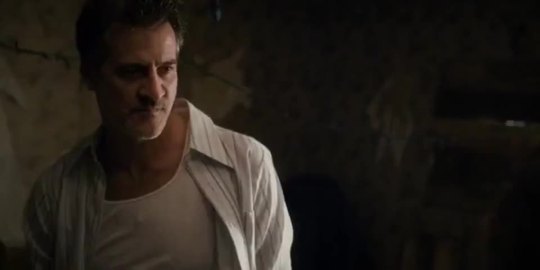
“The scariest monsters are human beings and what we will do to each other.”
This post is very much inspired by @/kaypeace21's post on Lonnie from 2021. Just so you guys know, kaypeace21 theorized Byler LONG before most of us. She has a pretty good track record for predicting aspects of Stranger Things. This post will include some of her brilliant finds and will add even more evidence that was introduced to us in ST4 and TFS.
Warning: this post discusses some VERY dark and mature themes. I will allude to dark stuff at first but will leave the darkest stuff below the cut.
CW: Ab*se, CSA, substance use, DV...
The name Lonnie (nickname of Lawrence/Laurence) has two specific relevant meanings:
Lion and Oak tree. x
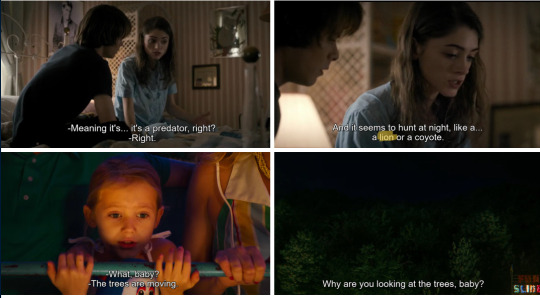
(Some symbolism examples: Nancy compares the Demogorgon (also titled: Deep Father) to a lion in ST1. In ST3, Holly notices trees (what looks like oak trees...) and looks frightened.)
For every mention of trees and predatory cats/lions I will add 🌳and 🦁 emojis respectively.
Keep both of these in mind as both predatory animals/cats and (creepy) trees are common occurrences within Stranger Things. I will touch on both of these throughout the post.
Anyway, lets start with the surface level stuff we know then I'll touch more on the darker subtext.
So, who is Lonnie Byers?
When we first hear the name Lonnie, he is brought up as a potential suspect by Hopper in Will's disappearance.
Joyce is quick to dismiss him as a suspect but does give us some important information about his character:
Lonnie "used to say [Will] was queer. Called him a fag." Whether or not he would say this to Will's face... he's obviously, not a great guy or father.
Joyce and Lonnie are divorced. She hadn't heard from him in about a year.
He doesn't like cops.
In The First Shadow, we actually learn that this is not the first time Lonnie is seen as a suspect in a case. (spoilers in next paragraph)
Lonnie was mistaken for Victor Creel and he was investigated for the animal murders by Hopper. This was not just a random choice, remember, Lonnie's name means Lion as in the predatory animal 🦁. Jonathan also told us that Lonnie made him hunt rabbits. This is a major hint! So, Victor Creel is innocent, and near the end of the play, Henry tells Joyce that she's so close yet so far from the truth (I'm paraphrasing). He's absolutely right though, the truth was right under her nose but unfortunately she doesn't see it (yet).
The fact that they made a very obvious comparison of Lonnie Byers to Victor Creel, the suspected murderer of his entire family... lets just say... it tells us A LOT.

Anyway, back to learning about Lonnie in season 1.
Joyce tries to reach out to Lonnie about Will, but is unsuccessful. He doesn't pick up the phone. His girlfriend does and says he's unavailable.
In a flashback, we hear Joyce and Lonnie argue about Lonnie not coming to play baseball with Will. She says she's "so sick of [his] excuses" which obviously means he has frequently made false promises/let Will down. He obviously does not prioritize Will.
To further prove that point, we later literally see him close Will off as he hammers wood right in the entry way for Will to return. The comic about Will's time in the UD gives a heartbreaking look into Will's POV. He cries to his father to not shut him out, but Lonnie ignores Will's cries...
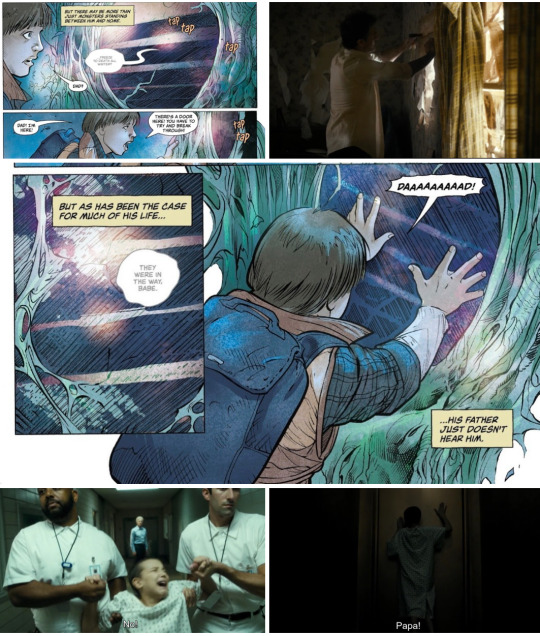
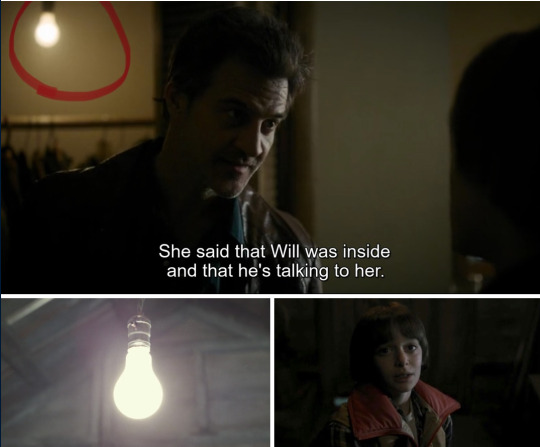
Paralleling El's flashback to when Papa locked her in the dark room and ignored her cries... (the existence of that scene and many other flashbacks with El and Papa make me strongly believe that El's memories of Papa are altered version of Will's memories of Lonnie... I won't go into that much though in this post).
Just look at that obvious bright light in the closet behind Lonnie. Same light Will stared at prior to vanishing… That accompanied with El’s flashback of being locked in a room alone, paints a rather grin image. He’s trying to shut Will out.
Just from these clues so far, he’s not a good father.
To stay or to go…
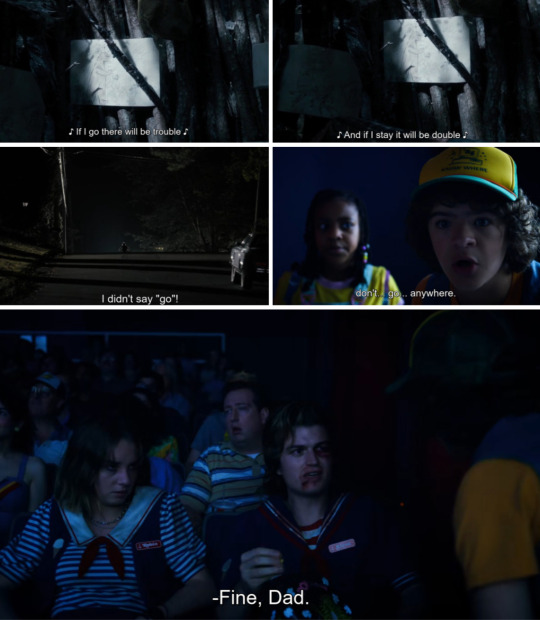
(a bear (Will) vs. a tree branch 🌳)
If you pay close attention, you’ll see many references to this song within the show… and they even specifically made the association between a father and son when Steve called Dustin “dad”. Which father and son pair are the most associated with the song? Will and Lonnie… as that song first played in the scene where Lonnie tells Joyce he won’t be taking Will to baseball practice.
We can tell from these moments (and more) that dad wants Will to stay put and not go anywhere. We even have Dustin (the one symbolizing “dad”) telling Will to “get back here… I’m going to kill you.” Those were also the last words spoken to Will before he vanished. This is significant.
Suspicious Evidence...
When we see Jonathan visit Lonnie's looking for Will, there's a small bike behind him.

We know Will left his bike in the forest 🌳 when he vanished. Why does Lonnie have a child's bike?
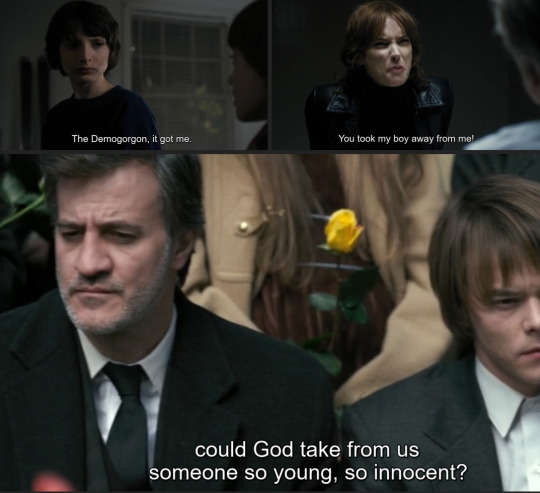
Demogorgon also means "The Deep Father". I talk more about this here. Will is telling Mike in code that his father "got [him]".
Joyce is yelling at "Papa" that he took her son away.
The line of God (aka a father) taking "someone so young, so innocent" at Will's funeral with the focus on Lonnie.
In TFS (spoiler), Lonnie admits to stealing baby Jesus from the Nativity scene.
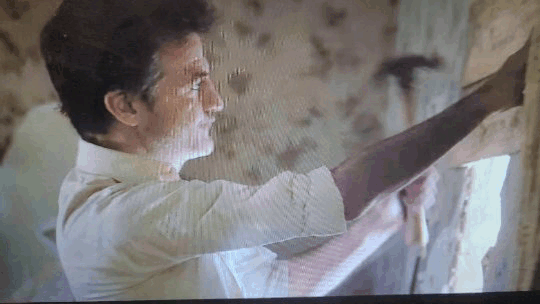
(GIF credit to @/kaypeace)
This specific shot tells us what we need to know. Lonnie is responsible for Will's disappearance. He is hammering the nail in the wall and it directly cuts to Mike representing the gate being opened with a pencil and paper. Lonnie is the reason the gate opened in the first place! Now, when I say that I don’t mean he literally opened the gate, I mean that the a*use he inflicted onto Will had caused all the monsters within the show and the creation of the Upside Down. Bold claim to make, I know… but bear with me here. As I will now go into the darker clues…
Lonnie's "Type"

Joyce refers to Lonnie's girlfriend as a "teenager". This is significant! Because (spoiler for TFS), Lonnie dated Joyce when he was 25 and she was 17!
This is a pattern for him. He not only preys on animals 🦁, he preys on teenagers... and it gets even worse.
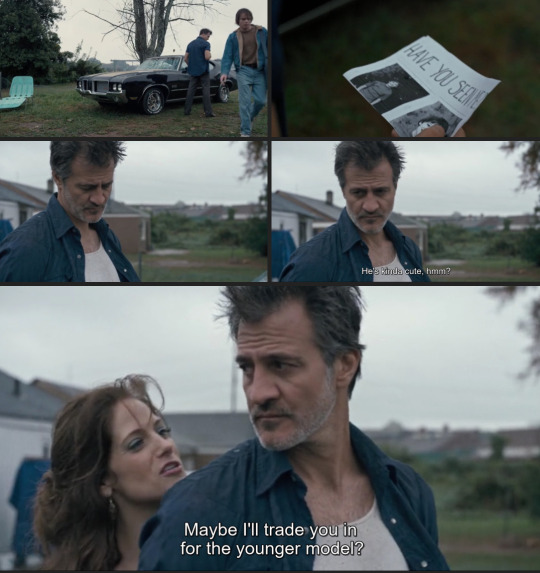
Look, the implications here are, unfortunately, very clear. We see Lonnie look at Jonathan walking away, then he looks down at the photo of Will with the dialogue "He's kinda cute, hmm?"
"Maybe I'll trade you in for the younger model?" is said while Lonnie looks in Jonathan's direction.
Trading someone for someone younger. He likes them young.
He is a predator. You may not want to believe the truth here but as we know with this show... everything is intentional.
Let’s continue on with even more disturbing clues…
When Joyce and Hopper find Will in the UD, he is in a library (a place of archives, of documented history) And he appears like this...
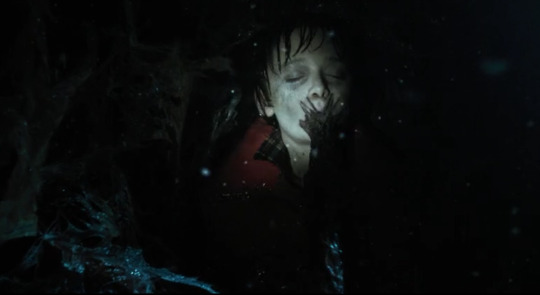
He's being violated... by the vines. Vines, that grow on trees. 🌳Lonnie means oak tree... This is a representation of documented history that he had been se*ually assaulted by... the tree with vines... Lonnie. Also if you look into the full lyrics of “Should I Stay or Should I Go”… let’s just stay it’s disturbing how that song is associated with a young boy and his father…
Also... keep in mind that the vines are preventing Will from speaking. Will is being silenced as well.

Next season we see the MF force itself into Will. Again, another violation, this time by the MF (yes- the mother fucker, that is what Lonnie is after all). This was done on a field. A baseball field. We know Lonnie is associated with baseball.
And again, the MF (father) is silencing Will...

In this scene in ST3, we get yet another reference to Will being violated in the past. We are shown a flashback of the MF possessing Will, and we are given the comparison of non-consensual sex and the gate/door opening. We know this due to the term “penetration” being used in relation to opening the gate…
Murray states "the door had been opened once" while we are shown Joyce with a look of horror on her face. "It was still healing", as experiencing that does require a lot of healing.

“Larry the construction guy”. Larry is a nickname for Laurence. Lonnie is another nickname for Laurence. This line by Jonathan has multiple meanings.
Lonnie is in Will's head.
“Stuck up your nose”. Lonnie is, again, represented as violating Will.

When Jonathan confronts Lonnie we can see this Evil Dead poster behind them. Not only is it very visible but… Lonnie draws attention to it. This poster is significant! This woman is being attacked and choked by a tree. 🌳 The tree goes inside her… it violates her.
Lonnie wants Jonathan to take down the poster. This is important. He wants Jonathan to stay silent. More on this later…
If this isn’t enough symbolism to convince you, check out kaypeace21’s post where she goes in even more depth around the music/musicians Jonathan references, and even more background details that add to this. They intentionally painted the picture of him being a s*xual a*user, as the existence of all these clues all add up to the same conclusion. A very uncomfortable truth.
Dad, you’re choking me

Speaking of being choked, ever notice how this is something that seems to occur frequently within the show?
That Mike and Ted moment in particular stands out because it occurs right after the Jonathan and Lonnie confrontation with that Evil Dead poster in the background (being choked by a tree 🌳)… so the “dad” doing the choking here is absolutely Lonnie.
Yet another case of being silenced as well...
The Trunk
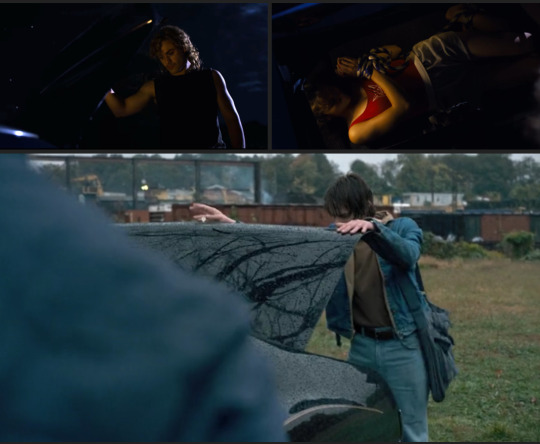
Probably the most concerning moment to many on the surface. Remember how “dad” said “don’t go… anywhere” and the symbolism of him shutting Will out? Well, let’s just say that it’s not a stretch to think he put Will in a trunk before.
It’s also worth noting that when Billy opens the trunk to see a tied up Heather we get a flashback of him choking her. This William is likely replaying the ab*se Will went through… he was possessed by the MF (father) after all.
Also, remember in ST2 they tied Will up and he shouted several times “why am I tied up?” Yeah… Also all those being suffocated references…
Substance Use
While everyone can struggle with substance use and it doesn’t make them a bad person, the use of substances causes the lowering of inhibition. “Lowering inhibitions means reducing restraints against behaviors that might normally seem inappropriate, dangerous, or taboo.” x This is why people under the influence of alcohol, and harder drugs can become more aggressive and a*usive.

When we see Lonnie's house, we see many cans of beer. We also see him drinking while he visits Joyce. He also encourages Joyce to drink too to help her "think straight". Hmm... strange choice of words I must say.
Now, I don’t think Lonnie just has an alcohol problem, I think he also has a stimulant use disorder. Stimulant = drugs like cocaine and crystal meth.
Kaypeace21's post goes into the details of the possible crystal meth use and how when Will was possessed by the MF, he was showing symptoms of a child on this specific substance (sweating, trembling, seizures, etc).
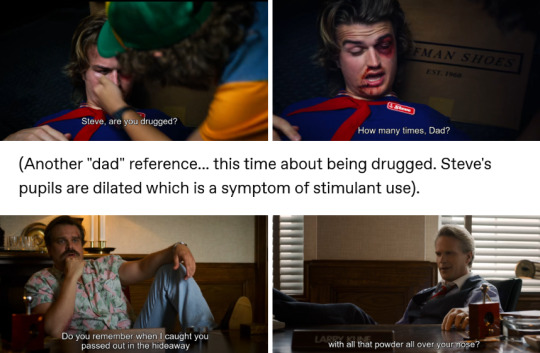
Another stimulant use reference, but cocaine this time. Remember Larry = Laurence = Lonnie.
There are many subtle references to drug use throughout the entire show from Papa forcibly injecting Terry Ives, El, Henry etc, to Reefer Rick and Eddie and plenty more.
Although we don't have much information on this, I think it is implied that Lonnie is a drug user. Not only does this mean that his impulses were less inhibited, but this also puts into question the possibility of further neglect. The Byers are not rich by any means, and if Lonnie is so focused on obtaining substances... that leaves barely any money for anything else.
"He made me do it…"

So as Jonathan told us, Lonnie made him kill a rabbit. The lion 🦁 forcing his offsprings (lion cubs) to hunt and kill, just like him.
This is something we have seen quite frequently within the show:
El being forced to harm a cat by Papa
Henry being forced to harm a rabbit while influenced by the MF (father)
(In TFS) Henry being pressured to harm animals by Papa
Will saying "He made me do it" in reference to the monsters attacking (he being the MF = father)
Billy saying "He made me do it" (again he being the MF = father)
D'art killing Mews
What's interesting to note is the fact that many characters are associated with rabbits and/or other small animals.
This likely also connects with the reoccurring theme of survivor's guilt within the show. Specifically, of the survivor blaming themselves for the death of others.
Max blaming herself for Billy's death
Mike blaming himself for El's death
El blaming herself for the death of the lab kids
Nancy blaming herself for Barb’s death
Lonnie forced Will to cause harm and/or blamed Will for the harm caused. We know how Will is, he's incredibly sensitive. This absolutely would weigh on his conscience.
Where’s mom in all of this?

We know she has been working a lot, but there could also be something else going on here. Could the allusions to her mental health issues come into play here as well? It's possible...
During "the source" scene with Billy's memories, Billy cries out because his mother is gone. Keep in mind, Billy's memories parallel Will's A LOT (the baseball, father calling him a "pussy"... etc), and the song "William" plays during this whole sequence.
It is likely that Joyce was separated (or emotionally distant) from Will for some time in the past...
Domestic a*use
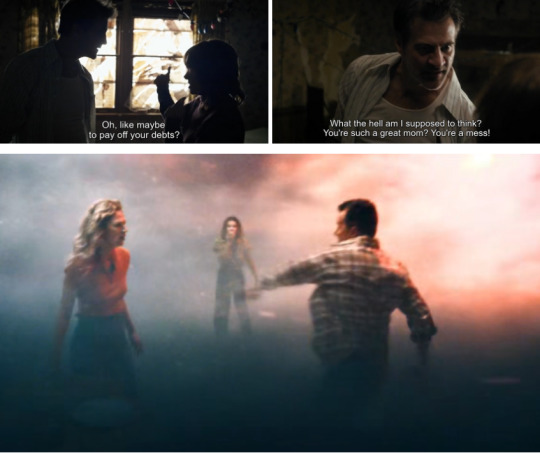
To make the assumption that Will had witnessed DV between his parents would not be a stretch. We have already seen Lonnie and Joyce fight and it was not pretty.
We also see Billy's father slap his mom hard in the face (like I said, Billy's memories parallel Will's memories...)
We also have seen Lonnie gaslight Joyce already, trying to make her think she's "crazy" and we've seen them fight about Will and finances. This was no stable household for a young child...
Fear of the Truth
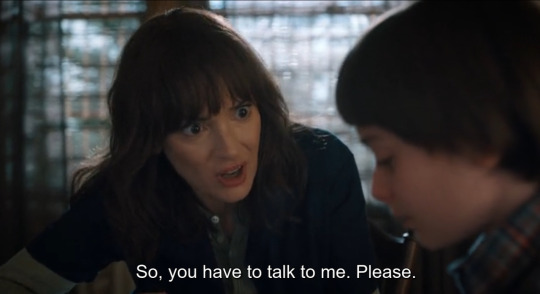
It isn’t discussed enough, but there’s a reoccurring theme of the fear of telling the truth. And no this isn’t just about coming out of the closet.
This is especially true when it comes to telling mom the truth.
El repeatedly preventing the boys from telling Mike’s mom what’s going on… specifically about the “bad men”. She fears the repercussions (demonstrating a gun pointed to her head… implying a threat… “I’m gonna kill you!”).
Mike and Nancy unable to tell their own mother what’s going on with them.
Jonathan unable to tell Joyce about “what’s going on with [him]”.
Lonnie telling Jonathan to take down the poster showing a*use and telling him to “behave” for his mother’s sake… he’s trying to silence Jonathan…
Nancy telling Mike “no more secrets”
Joyce telling Will he needs to talk to her (about what happened with the MF)
Dustin hiding D’art from his mother/the kids in general hiding the supernatural stuff from their parents
Billy unable to explain to Karen what had happened to him
Max telling Billy he needs to talk in the sauna scene
and plenty more…
Will frequently communicates in a code. We see this several times:
"It was a seven, the demogorgon got me"
Communicating through the lights
Drawing pictures instead of talking/explaining
Morse code
"Sometimes it can be scary to open up like that. To say how you really feel. Especially to people you care about the most. Because what if... what if they don't like the truth?"
The painting itself
The painting speech... using "El" instead of himself
Usually a*use of a child is not immediately obvious. Parents often think that they will immediately know if their child has been a*used, but often, the signs stay hidden. Remember that most kids are a*used by adults they know. X
Some of the common reasons why child stay silent:
They worry about being blamed, or mistakenly believe they caused the abuse.
Their a*user has threatened them in some way.
They know and maybe even feel close to their a*user and don't want to hurt them.
They think no one will believe them or help them.
Babies and children under 5 years old—who make up nearly 40% of maltreated kids—may not have the words to explain what happened to them, making it difficult or even impossible for them to ask for help. X
This is just important information that everyone needs to know. Child a*use isn’t obvious, the kid may even seem alright with spending time with their a*user… this does not mean the a*use doesn’t exist. That is a very harmful claim to make.
When it comes to a*use, especially child a*use, we must be vigilant. Because the child likely won’t tell us but they will show us the signs.
Some signs to look out for:
Any sudden, continued change in behavior.
increased anxiety
unexplained injuries x
Repressed memories

I’m just going to outright say it: the NINA plot line is important because it tells us a lot about repressed traumatic memories.
“Our brains have a defence mechanism in place to protect it from bad memories. You buried these memories long ago.”
Then in the last episode of ST4, we learn something VERY telling about Will.
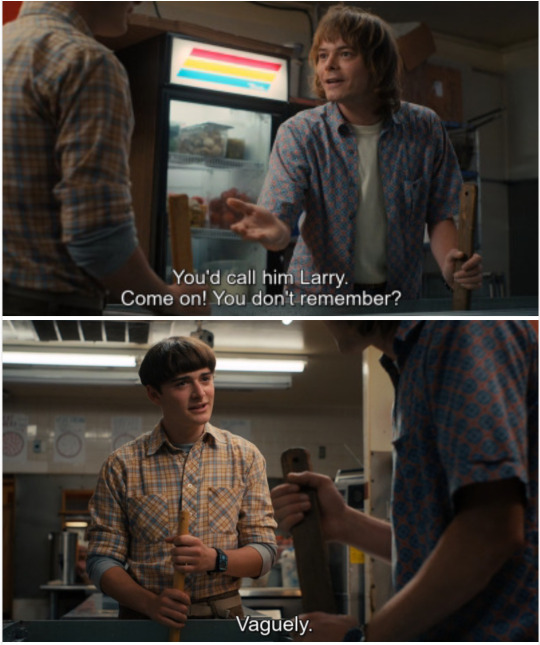
Remember… Larry = Laurence = Lonnie.
They basically told us that Will only vaguely remembers Lonnie. This is an incredibly important clue to what Will is going through. Will’s trauma was so intense that he has been repressing the memories of his own father.
In ST5, this is absolutely going to be an important aspect to his arc and to the story as a whole. Will must come face-to-face with his traumatic past. Unlocking those memories will be key to finally defeating the monsters for good.
The Destroyer of Worlds

So, I’ve mentioned this many times before, but Will is compared to “Little Boy” the first atomic bomb. (Click here and here for posts about it).
He is a bomb that went off on Nov 6, 1983, freezing time, and forever changing Hawkins. J. Robert Oppenheimer was the creator of the real atomic bomb, and he was known as the “Father of the Atomic Bomb.” He was also known as “The Destroyer of Worlds”. Because Will is “Little Boy” and Lonnie is his father…
Lonnie is The Destroyer of Worlds. A perfect term for someone who inflicted such horror onto an innocent child. Because trauma like this has an incredibly profound effect on a young mind, in more ways than you can imagine. His actions are the catalyst for the chain reaction of this entire show. He pushed over that very first domino.
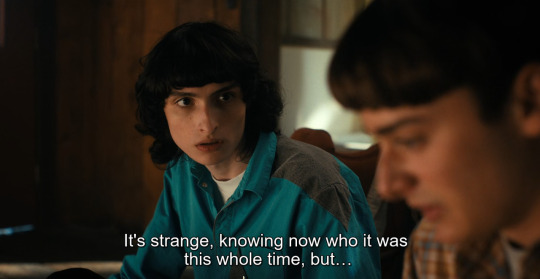
Why is all of this evidence so hidden? Why do we barely know anything about Will’s past with Lonnie? Because… instead of telling us his past, they’ve been showing it to us through the horrors. You have to look very deeply into the show to see the truth start to add up like a puzzle. There are many themes that reoccur/are alluded to within the show for a reason. And it’s all from one single source.
Demogorgon is The Deep Father, MF is the mother fucker (father), Papa is father, and it was Vecna’s father who was convicted of the murders.
It was father this whole time.
320 notes
·
View notes
Text
THE BEST FICTION I ENCOUNTERED IN THE SECOND HALF OF 2024!!!
A much longer follow-up to this post. (Can you imagine how much I'd need to type out if I hadn't split them up???)
Once again, I'm not listing movies, TV shows, video games, etc. I AM listing some web fiction and comics/graphic novels, because I feel much more qualified to judge and recommend those things.
____
Novels and Novellas!
Failure To Comply, by Cavar (2024): Reading Cavar’s Failure to Comply, I couldn’t help but think of the recent David Cronenberg movie Crimes of the Future. Both deal with dystopias in which bodies and their modification are strictly regulated, and people with unauthorized bodies form a vibrant, perpetually imperiled subculture on the margins. Both use this conceit to speak metaphorically about the plights of trans and disabled people, although Failure to Comply’s characters are also presented as literally, textually disabled and trans. But, although Crimes of the Future is often accused of being a “weird movie,” Failure to Comply is undeniably much, much weirder. Cronenberg is super normal compared to this.
Maej, by Dale Stromberg (2024): a doorstopper I found difficult to put down and finished inside a week; a work of very unapologetic genre fiction that’s equally unapologetic in its intelligence and dedication to doing strange, creative things with language; a high fantasy story I actually liked. The setting is the city of Sforre-Yomn, in the country of Hwoama, whose culture combines elements from across the continents of Asia and Europe. But Hwoama is matriarchal: men are subordinate to women, who dominate politics, business, the military, and nearly all other professions. As a result of this fact, almost all the major characters in the novel are female. By turns this presents a fun, simple, mischievous inversion of maleness as the unmarked default state for fictional characters, and meaty commentary on the social construction of sex, sexuality, and gender. Stromberg has cited Le Guin as an influence on Maej and, in the most complimentary way possible, this influence is evident.
Lote, by Shola von Reinhold (2020) is a gorgeous, funny, moving academic satire/mystery and love letter to Black modernism. It’s also very queer/trans and (in my personal opinion, perhaps not intentionally) very autistic. The title refers to a possibly-mythical clandestine circle of artists/magic practitioners who style themselves after the lotus eaters and seek transcendence via experiences of sensory and aesthetic pleasure. As with many novels that stand out to me, you won’t read anything else like it. I especially recommend this one if you want a completely unique, intellectually stimulating work of fiction, but are put off by the aggressively experimental and opaque style of Failure To Comply and by the SFF-ness of FTC, Maej, and Leech.
Walking Practice, by Dolki Min (trans. Victoria Caudle) (original 2022; English translation 2024) is a breezy, sexy *, gender-bending Korean novel about a poor amorphous space alien stranded on Earth after a spaceship crash. Unfortunately for us, this alien soon discovers that 1.) the most suitable food for it down here is human flesh, and 2.) with a lot of pain and effort, it can squeeze itself into the likeness of a variety of different human beings. It figures out hookup apps pretty fast, too, and then it’s off to the races. This may sound like creature horror, but it plays more as an exploration of identity and humanity, and a satire of sex, romance, and contemporary hookup culture. (*possibly less sexy if you don’t have a vore/cannibalism/consumption thing)
Love/Aggression, by June Martin (2024) is a BANANAS mundane fantasy-comedy about two trans women who are kind of best friends, and kind of enemies. Zoe (actress) is an arrogant, cartoonishly unpleasant minor celebrity who thinks she’s much more famous and popular than she actually is— but Martin manages to show how her personality is in part the sympathetic result of dysphoria and experiencing a lot of transmisogyny over the course of her life, and how she used to be a much kinder person before fame went to her head. Meanwhile, Lily (freeloader and aspiring tattoo artist) is a sweet, spacy, passive daydreamer, and a far more immediately likable character— but Martin manages to show how she is not entirely blameless in the ongoing drama with Zoe, how her passivity is sometimes the result of immaturity and selfishness, and how even when it isn’t, it’s a character flaw that keeps landing her in situations which kind of suck for all parties involved. They live in a magical Pittsburgh that is, conveniently, located right next to Los Angeles. Their friends include a BDSM cult leader and a nonbinary person whose name becomes “Dicks” in the first chapter of the story and who is never called anything else. (This character also happens to be the…owner? Custodian?…of an infinite, maze-like, reality-distorting building that is probably the most fun and least scary infinite, maze-like, reality-distorting building in all of fiction.) There’s vore in this one, too! But don’t go in expecting a particularly cohesive plot: Love/Aggression is far more about characters, relationships, and gags.
Maybe the Moon, by Armistead Maupin (1992) was inspired by the too-brief life of Maupin’s real friend Tamara De Treaux, a little person who depicted the title character in parts of the movie E.T. Her literary equivalent, Cady Roth, is a sardonic, fashionable, thirty-year-old little person who depicted a magical gnome called Mr. Woods in a beloved, albeit treacly, children’s fantasy movie of the same name. But since she played the role inside a thick rubber suit, and since the director of the movie felt it would spoil the magic to give her any credit, almost nobody knows that. Ten years later, she lives in obscurity on dwindling funds and struggles to find work…until, out of sheer desperation, she decides to take a job with a troupe of children’s birthday party entertainers. Romance, escapades, etc. ensue. Both a very funny book and a very sad one; it’s quite frank about death, about the ways Hollywood fucks people over, about the many ways that, especially if you’re marginalized and/or an artist, your life isn’t fair and isn’t ever going to be fair and “happy endings” probably aren’t what the world has in store for you. I think ultimately it’s sentimental in a good way; it has a big heart.
Leech, by Hiron Ennes (2022) is a total banger to finish out this year with! So glad I picked it up finally! Absolute genre jambalaya, this one: sci-fi, stuff that reads as fantasy despite having or probably having a “sci-fi” explanation, horror, Gothic novel (but not, crucially, a Gothic romance), mystery, medical thriller, character study, philosophical novel about ideas of consciousness, selfhood, individuality, and free will…there’s probably something in here for everyone reading this. You’ll love it, almost guaranteed, if you love the Gormenghast books. You’ll love it, almost guaranteed, if you love any Star Trek series. You’ll love it, almost guaranteed, if you love the science fiction of Peter Watts, or the horror of Gretchen Felker-Martin. You’ll love it, almost guaranteed, if you love The Thing (1982). The prose is lush, idiosyncratic, a bit purple, but it’s nothing too baroque, it’s all perfectly easy to read. The complicated, antiheroic protagonist/narrator is delightful and memorable, and I think Ennes did a great job at conveying unusual states of memory/selfhood/cognition through it/them/her. (Some of these states are not ones with which I have, or even could possibly have ever had, real experience, but some are, and I am always pleased to find those replicated in ways I can recognize and feel as “truthful.”)
Short Story Collections!
Stone Gods (2024) and Worse Than Myself (2009) by Adam Golaski contained several of the very best short stories I read this year— especially Worse Than Myself, which is also a slightly more accessible/“normal” story collection and the one I’d recommend starting with. Golaski writes eerie, dreamlike, bizarre fiction that frequently crosses over into horror— even including time-worn horror genre tropes like zombies, ghosts, and vampires. But let me tell you, Golaski’s “The Man From the Peak” (in Worse Than Myself) is a BAD time, like give-you-nightmares scary, and it feels like nothing you’ve ever read before, even though it’s about A Nosferatu. Not just a vampire, but a vampire that is explicitly described as egg-bald with big pointy ears and two sharp buck teeth. That’s the antagonist. And it fucking works. He makes it new. Please, please read Adam Golaski, you guys. It is astounding and unjust that he’s not popularly regarded as one of the 21st century’s best authors of weird short fiction. I don’t actually know if he could have/wanted to publish more than two collections over fifteen years, but I kind of feel like maybe if a lot of people and public libraries buy those two collections, he’ll have more space and incentive to write short stories, and/or more publishers will be interested in picking up another collection of his short stories?
Brave New Weird vol. 2 (2024) was a diverse, entertaining selection of stories. Some I’d read, some I hadn’t. A pretty good overview of the mostly small press horror/sci-fi/Weird fiction scene as it stands right this minute.
All Your Friends Are Here, by M. Shaw (2024) is almost the opposite of the Golaski collections, in a way: Golaski frequently deals with themes of nostalgia, the past, cycles that repeat without end, and timelessness or being outside of time. Moreover, most of his stories feel like they’d be immediately comprehensible to a person fifty years ago or fifty years from now, if not even further into the past/future (with, perhaps, a few footnotes of cultural explanation). But Shaw’s stories are, often aggressively, Of The Moment. And that’s not a bad thing, even if it means they may seem completely dated in a few decades. Shaw is interested in speaking directly to their place and time; directly to us. They’re not going to pretend we’re not all online, that we don’t all know (if against our will) what Ready Player One is— the longest piece in the collection, and one of the best, is a suitably pop-culture-reference-laden dunk/riff/spoof on, and rebuttal of, Ready Player One! These stories are angry and clever and sometimes suffused with a kind of exhausted tenderness. There’s clearly a Bizarro influence on some of Shaw’s work, but their writing is more sophisticated and restrained than what I tend to associate with Bizarro fiction proper.
Individual Short Stories (That You Can Read Right Now!)
“EGREGORE” by Samir Sirk Morató (2024) = clubbing, hallucinatory, girl on girl
“The Spindle Of Necessity” by B. Pladek (2024) = trans academic suspects dead author may have been a closeted gay trans man
“A History of the Avodion Through Five Artists” by Eric Horwitz (2024) = Borgesian, arch, Jewish
“Mad Studies” by Cavar (2024) = loneliness, cats, autism…like Failure To Comply, this is by @librarycards
“Alabama Circus Punk” by Thomas Ha (2024) = robots, the nuclear family, disintegrating language
Comics and Graphic Novels!
Tomorrow You Don't Know Me, by Raven Lyn Clemens (2024) is a subtle, moving, and unsentimental graphic novel about being a middle schooler with problems, and how sometimes those problems just kinda...persist no matter what you do or try or want, and no matter if it's fair. Even if you summon a demon to help you! Clemens is really skilled at depicting emotion visually, at communicating both the absurd goofiness and the deep, genuine pain of the outsize negative emotions her characters experience. All of her characters are at least a little wretched, and she also handles them all with great compassion, affection, and understanding. Check out her artwork at @ravenlynclemens please; it's fantastic cartooning even without any detailed narrative.
In Fair Verona, by Val Wise (2024) is a VERY gory, VERY nasty piece of lesbian Gothic fantasy horror-erotica. I love Wise's art. The bodies she draws, regardless of gender and build, are top-tier sexy and beautiful to me, which means he's often able to get me on board* with kinks and scenarios that would usually be too "extreme" for my taste. (*Genteel euphemism for arousal)
A Guest In the House, by E.M Carroll (2023) is an equally nasty and mean, but far, FAR less explicit and bizarre, lesbian Gothic horror story, told with the visual panache and inimitable art style everyone knows and loves Carroll for. It's a worthy successor to their previous material, and if it doesn't necessarily make enormous leaps from their earlier work in its writing, the drawing and coloring has gone from "already really good" to "some of these splash pages will blow your eyes out the back of your skull."
Expiry Date, by Sloane Hong (2024) is another lesbian/queer erotica comic. This one's science fiction, and is FAR more up my usual alley of kinks. Which is to say that the lovers are quite kind/polite with one another (in a lot of ways it reads as a meet-cute), but also one of them is a hired killer who dispassionately agrees to torture the fuck out of the other one David Cronenberg-style.
Once again, all my comic recs are by queer trans people! I think I made a pretty hacky joke last year about gay trans mascs specifically ruling in this field, but based on recent data, you just have to be a marginalized gender and not heterosexual to make amazing comics.
Web Fiction!
The Frenzy wiki is a fan wiki for an imagined TV series, telling the story of both Frenzy, a popular late 2000s ensemble cast drama-adventure-SFF show drawing equally from the likes of Twin Peaks and Supernatural, and how the existence of this show was mysteriously wiped from the face of our reality-- save in the troubled dreams of a select few. I would estimate it takes a couple hours to explore the whole wiki. (2022 or 2023?)
3D Workers Island is the phenomenal, if less ambitious, follow-up to Petscop. (I don't mean it's a sequel; it's just by the same guy and covers similar thematic ground.) Like its predecessor, it's more about dropping tantalizing hints than letting you in on "what's actually going on," and more about giving you a creeped out and vaguely depressed feeling than about scaring or shocking you per se. It's really smart and well-crafted in an understated way, and does a great job replicating early internet content. I would estimate it takes WELL under an hour to get through this story, although you will probably want to immediately go back and look for things you might have missed or not understood properly. (2024)
Martin's Movies is conventional, compared to the other two. It's a ghost story. But it's a very creepy, effective, well-told ghost story rendered through the unusual medium of letterboxd reviews (of course, these become increasingly diary-like and Not About The Film as the story progresses). I would estimate it takes under an hour to read the whole thing, it's like short novelette length. (2024)
158 notes
·
View notes
Text
Hot take? A show with queer people in it from the beginning was never queerbaiting and— very literally and technically— never could. In the first episode, a gay man comes out to his family. And he doesn’t stop being gay after that; it’s a major plot point and part of his character going forward. You’ve had a married lesbian couple from the jump who are proud and unapologetic about their love for each other. The story has also portrayed several queer couples and stories in episodic plots, including featuring queer weddings.
Buck didn’t suddenly “become” bi. Queerness is not when straight people “turn” queer. He has been attracted to men the entire time; he has always been bi. Understanding yourself and your sexuality as a queer person is often so difficult under heteronormativity. Sometimes, it takes time.
Hell— Buck checking a guy out some time in season 3 or getting flustered by the idea he might like a guy, etc, etc, are not even examples “queerbaiting,” nevermind how the show already features queer stories.
I genuinely think some of y’all are just mad that he’s not sucking face with the man you want him to, and are being weirdly homophobic about it. “Buck kissing this man is kinda off-putting, lmao.” “Buck and his bf’s relationship is awkward. IDK, but it weirds me out.” “There’s something so cringe about Buck’s relationship—” “Who dates someone they haven’t been friends with for years first? It’s kinda creepy…” “I think their relationship is a weird mess. It’s not as meaningful as a slow burn.”
Life isn’t fanfiction and fanfiction tropes don’t make good writing. Most relationships start out with a “hey, I’m interested in you, let’s get to know each other.” You’re just transparently uncomfortable with two men expressing that interest in each other outside the arbitrary rules you’ve established to make a mlm relationship “legitimate” or “meaningful.”
[Fanfiction] tropes— from “there’s only one bed” to “we’re forced together, but fall in love anyway”— are responses to the sex-negativity and purity culture norms forced upon gender and sexual minorities. They provide a workaround for these norms but never a direct challenge. It’s like the Family Guy episode “Prick Up Your Ears,” where conservative Christian abstinence-only sex education leads to kids having ear sex. Ear sex is the workaround to the abstinence and purity rules they’d been taught, not the challenge. We still have stringent rules around who can touch whom and under what circumstances. Tropes reflect this. So, a trope like “there’s only one bed” provides the characters with a justification for their intimacy without directly challenging why it is taboo.
You’ve convinced yourself that shipping— and thus the tropes it employs— is more subversive than actual representation, and the people caught in the crossfire are actual queer people.
Also— for the love of fuck— stop comparing every mlm relationship to RW&RB.
#911 ABC#911 Fox#do you know how long it took me to understand#that my crushes on men were crushes#and not just ‘Wow. He’s neat. I really wanna be friends.’#‘Wow. I like his vibe and style. I wanna… be friends? Be— hold up.’#I thought I was asexual#‘Well. I have no interest in dating a girl. But I also just really wanna be really very good friends with guys. So I must be ace!’#No. Wrong. I was very mistaken#I also very much hate what RW&RB has encouraged in cis het ppl#evan buckley#tommy kinard
437 notes
·
View notes
Text
who's getting books and who isn't?
tells you a lot actually
in lieu of us getting a Dustin companion book soon i'm doubling down on my point about how insanely telling these books are about where the story is going. especially if you look as who is getting books. and i'm saying this both about El and Will (where it's already kind of obvious why s5 is important for them) as well as Mike (where it's also kind of obvious why s5 is important for his character but it hasn't reached mainstream awareness yet apparently lmao)
as of now Lucas, Max, and Dustin (about to come out), as well as Robin and Eddie, and even Hopper and Terry have one. and they all explore things outside of the main canon by doubling down on what filmed canon already established and adding a bit more layers since they have the time to focus on a single character (like exploring racism and how Lucas deals with it in his book, something the show doesn't dwell on, or exploring Robin's queerness, taking place before the events of s3)

and the focus these books have makes sense since they're mostly written by commissioned writers. so obviously they want to skirt any topics that delve too much into plot heavy areas where the writers a) wouldn't know where the story is going or b) even if they got notes, you don't want important lore drops that impact the later story dropped in companion books
in short we're getting extra story's about no spoilery topics the main story doesn't have time to/want to explore
which makes it all the more interesting we're already getting books about someone like Robin when you know if you asked fans what povs they'd like to see someone like El would rank significantly higher if you trust favourite character rankings. but for some reason El, Mike, and Will have never gotten one
and some of these reasons are just really obvious, especially when it comes to El and Will
1) they obviously can't just drop a book on El yet. on one hand, because her backstory with the lab is a major plot point of the show and they can't spoil it in a book (even if they tried excluding it, writing 200ish pages for a character who can't remember what happened before they turned like 8 is one of those things that would be kind of hard to avoid coming up). even post s4 there's still so many questions about her past and time at the lab, they just shouldn't give unlimited access to her inner monologue about it yet. and on the other hand, El finding her place in the world is quite literally one of her characters main recurring motives, even a companion book as innocuous as "El tries out hobbies" would be exploring something we'd kind of want to see on screen since it'd be a resolution to her character growth and not a fun side quest
2) they also just can't drop a book on Will. the fact that we never found out what actually happened to Will in the UD is already reason enough, the show clearly wants to explore it on screen later on. (now even more obvious since there's already confirmed s1 UD Will in the s5 official teasers). you really can't write a book from someone's pov who's main trauma and life changing moment is something you don't want to get into yet. just doesn't work
there's plot points the show obviously saved for later so both Will and El are pretty unfit as book topics
but with Mike that doesn't actually apply in the same obvious way. Mike not getting a book despite being the leader of the party, having the most on screen defined dynamics with the other kids, and being part of the shows "main" ship would be really odd. like. Really odd. on paper he'd probably be one of the first choices for an easy book protagonist for a fun party side quest. of course unless one of the two book deal breaker reasons applies also:
they can't give his pov because giving his unfiltered inner monologue would spoil s5
they want to explore something relevant to his character themselves on screen and it's not fit for a companion book
but again, in comparison to Will and El where the why is really obvious Mike sticks out because we don't officially know what he's got going on yet. he has no mysterious absence where we don't know what happened to him like with Will and no open ended origin story like with El
it just makes it a bit funnier to me how many people are still fundamentally unconvinced Mike has something going on that's important for the outcome of s5. post s2 the show tries to get some distance from Mike's head and he's joined the club of main characters who don't get books alongside major canon event magnets El and Will. and yeah, obviously you wouldn't want a book from the characters pov who's feelings and sexuality you're actively hiding. it's also a bit of a no brainer you don't want a companion work going into how he's not been doing so great over the past few years because the reasons for that are kind of relevant to the main story. Mike feeling guilty for El dying all the way in s1 is something that might be more fit to bring up in show when their relationship is being addressed instead of in side material
but all in all? the fact that out of all the kids El, Mike, and Will are the only ones who don't get secondary material yet is probably the biggest give away that the three of them are who s5 is planning to give the most insight on even all the in show build up aside. they're being skipped as book povs despite existing public interest and seeming like conventionally easy picks for book side stories
in the current economy around shows franchises, going against what'd be a good marketing decision is always a dead giveaway something is going on
294 notes
·
View notes
Note
so sorry but ive seen two different things about this now and im very lost, why did people think they were breaking up/broke up in 2012??? pls help me understand, wise keeper of the lore. thank u so much
response under the cut for general 2012 discussion/too long
basically 2012/2013 used to get (and sometimes still is) generalized as this dark and awful time period where dnp "hated" each other and us, when in actuality it was two very young very scared closeted queer people who were in the process of several major life changes at once while also dealing with a new exploding fan base
there's a few big things from that "era" that people talk about:
deleting old posts- around this era dnp deleted a ton of old tweets/formsprings/dailybooths that could read as them being in a relationship. they were blowing up online and had more eyes on them than ever before, not to mention had just starting working with the BBC (where being queer would have greatly affected their careers). also keep in mind dan was still in the closet to EVERYONE, and now he's got tons of fans going through his accounts and sending shit to HIS LITTLE BROTHER on tumblr asking if dan's gay. anyway people decided them deleting early tweets meant they had broken up
dan's customerservice tumblr blog- in the middle of them blowing up and people finding all these old posts, dan in an effort to control the narrative, makes a new blog for people to anonymously ask him questions (: which went about as well as you can imagine for an extremely defensive closeted 20 year old with undiagnosed depression. basically he said some unfortunately things out of fear
the video leaked again- won't get too much into that because of the subject matter, but the yeah the video leaked for the second time except this time way more people saw it/shared it and dnp actually had to respond to it this time. which is. just fucking awful and heartbreaking all around.
phil persona- basically this was the birth of the amazingphil persona that'd follow phil to the quiff era. he became more sanitized and less personable than original phil fans were used to (which got romanticized into uwu he's sad because he and dan broke up and now he's shutting down)
"no homo"- pretty self explanatory...people asked if they were gay (every single day constantly on every platform) and they would say no because what else are they going to say. this one particular vyou where dan's actually trying to make people think kills me (x) god he was so young. but they'd also started doing the "omg i don't want to see you naked/ew people want us to kiss" and the infamous "you need a girlfriend" "my future wife" etc etc.
the breakup rumors mostly stemmed from and became popular/ treated as fact by younger fans who kind of saw them as these fictionalized characters (which i mean not to blame them because they were literal children and youtubers were still so new that people did treat them like tv show characters you could be friends with). it also got turned into more sinister theories like the "dan is abusing phil" ones and "phil is actually gay but dan isn't and just used phil for attention and fame in 2009"
there was also factors like them moving to london in 2012 (and people were CONVINCED they'd stop being friends in london??), people thinking them getting popular would mean they'd get girlfriends like other popular youtubers (shoutout danrific shippers), and most importantly just them sharing less about their personal lives with their audience. like of course they're not going to live tweet their day/location anymore when people are showing up at their house and trying to find their families.
basically, dnp were putting boundaries between themselves and their fans, but the fans interpreted it as putting distance between each other. in actuality the 2012/2013 era was full of some really amazing memories and content and things people loved (literally the photobooth challenge is from 2013!! sleeping phil saying i hate you is from 2012!!!)
in conclusion, imagine building a forever home with your ex lmao
#anon ask#also id rather this not start discourse/more asks about the drama because i know its still a touchy subject for people#and not something we want to dwell on when we're in such a good place now#anon feel free to DM me if you wanna talk about it more though!!! totally get being curious <333#phan#dan and phil
137 notes
·
View notes
Text


Submission message for Steve and Bucky: Does Stucky count? Steve and Bucky from Captain America
Submission message for Charles and Erik: Charles Xavier and Erik Lehnsherr (aka Professor X and Magneto) from anything X-Men
Additional propaganda for Stucky:
Stucky: "Of course, this is still a rollicking adventure tale and no adventure is complete without a love story.....the longest, most tortured one in Marvel history" - Christopher Markus and Stephen McFeely (writers of Captain America movies + Avengers Infinity War and Avengers: Endgame)
"from the meet cute to the tragic separation, their bond has all the elements of a classic romance." - Christopher Markus and Stephen McFeely
"Just as Jeph and Tim’’s earlier Daredevil: Yellow, Spider-Man: Blue, and Hulk: Gray all dealt with the major love interests in, the heroes’ lives, so too does Captain America: White. Steve and Bucky are each other’s soulmate." - Christopher Markus and Stephen McFeely
“So you have a character in Captain America who is searching for the only thing that he has left from his past that has any meaning to him, and that’s Bucky; and people have interpreted that relationship all kinds of ways and it’s great...we will never define it, as filmmakers, explicitly." - The Russos (Captain America: Civil War press)
"You mean, aside from Cap and Bucky?" - Anthony Russo (co-director of Cap 2 and 3 and Avengers: Infinity War and Avengers: Endgame) when asked about romance in Captain Amierca: Civil War
"Moderator: But you already had a romantic B story with Cap and Bucky, right?
Anthony: We sure do
Joe: We still do
Moderator: Did you ever had to dial down the sexual tension on set?
Joe: Why would we?" - Anthony and Joe Russo (directors of Cap 2 and 3 and Avengers: Infinity War and Avengers: Endgame) at a screening of Captain America: Civil War

Just a few examples directly from Marvel and the writers and directors.
#between these two?? stucky hands down#yes both were called love stories but stucky wasn't called a love story just once
also to add on stucky became so huge and widely acknowledged by audiences you had stuff like bbc making a stucky fanvid
major companies like starbucks and astroglide tweeting in support of them as well as celebrities and big media outlets constantly writing articles about them (typically about why they should be made canon)
like stucky was featured in time magazine cuz it was the basis for the 'givecaptainamericaaboyfriend' thing that happened on twitter which ended up trending at number two worldwide
and not only are they mentioned in wikipedia's page on queerbaiting but wikipedia also has an entire page dedicated solely to the ship
Additional propaganda for Cherik
Okay but Cherik (Spot 12) is so incredibly queer I can’t even—
Like straight up they have a kid together because Professor X siphoned off Magneto into his brain and then they did a mind meld thing and Onslaught came out of Professor X like Athena from Zeus.
There was a recent story arc where they defeated Onslaught and the guy who defeated Onslaught straight up said something like ‘Professor X and Magneto aren’t doing anything because they have a soft spot for their murderous joint kid entity’. Please bear in mind that this guy is also straight-up Professor X’s son and a telepath.
Also this comic book cover is literally the gayest thing I have ever seen.

Magneto is a bara daddy for 0 reason and Professor X is supposed to be dead, yet looks like a twink having the absolute time of his LIFE.
Also in a marvel comic specifically for celebrating canon queer couples there’s this stunner of a panel:

Why is this not canon again???
God, the matched Hellfire Gala outfits are making me insane in the membrane.

For context here’s literally THEE couple of the X-men universe at the exact same party:

They’re complimentary— even they’re not fucking MATCHING. For the love of god just let the old men kiss holy shit.
#worstqueerbaittournament#worst queerbait tournament#cherik#stucky#captain america#x men first class#xmen#x men#mcu#marvel
73 notes
·
View notes
Note
u talking abt how a majority of the fandom still views kris as a boy whether they admit it or not reminded me of the youtube vids of the roaring knight battle, and how a lot of casual deltarune fans keep referring to the knight with male pronouns, despite the fact it’s literally only referred to in-game with it and them pronouns, AND clearly being noelle’s older SISTER.
no, of course the main antagonist of the game is a guy, of course the non-gendered character is a man actually

i don't think this is a casual fan thing though, the subreddit for kris/ralsei is literally, unquestioningly called "Toothpaste Boys" despite that being misgendering or whatever (and a casual fan is not gonna be making ship art for reddit they just play the game and fuck off). for any zoomie that hasnt been around for this long tumblr was once the male tears website 10-11 years ago, before it woked itself back into the same run of the mill sexism that used to be criticised, namely: Fandom worships male characters and undermines female characters; if a female character is too strong or too complex she must be some sort of trans (because women are only demure and sweet and feminine energy girl dinner don't you know) and mostly male characters have personalities and complexity. see for example the obsession with jevil and spamton, and, way back when, sans and papyrus. it's always been like this, this has always been the sexyman yaoi website. Kris being assumed male is downstream from that; because kris is a complex character they must be a tortured boy- if you go to ao3 and filter specifically for "female kris" and "afab kris" and look for the most popular fics they are ALL about kris having intercourse with spamton, or some other male character, often nonconsensually, and it's mostly fics with kris as a boy that afford them will and motivations (despite both groups of fics insisting that kris is Non Binary and Uses They, Thank You, only one of the assigned sexes at birth is being treated as a human being, and it's not female non binary kris). It also happens because tumblr wokism left wing nonsense is not left wing in any way that matters, it's literally built upon saying what my parents don't like to be cool and subversive, without questioning what exactly my parents said that is wrong. So all of the same conservative biases like male as default, a very basic sexist tenet that has caused things like medical care for female people to be vastly neglected, stay basically intact while pretending that they're being subverted somehow. This is why people are calling the knight and kris he: they're not reading, they're not filtering for the most basic biases of being raised in our world that they pretend they are, or often both. This is also why people are coping themselves into knots about how ralsusie is yuri and one of them is trans and non binary and autistic and italian and a quadruple amputee, because my parents are a heterosexual couple with emotional commitment, and i can't do that, i can't afford to believe that a heterosexual relationship can have an interesting chemistry and narrative beats, so i'll use that loophole to get away from it, to make it weird and "queer". it's incredibly shallow once you spend a while away from fandom spaces and think about it. It's also incredibly sexist to suggest that a boy and a girl can't be gnc and just be themselves, that they must be in denial about their "true self". Which I honestly would not criticise if people admitted that they're massive hypocrites. Like stop pretending at least. I'm sure the it and they for the knight is in fact playing with this, given both candidates for the role are female, and it's meant to obfuscate this fact (despite it being obvious lol) for narrative suspense and so that it comes as a surprise to the characters. In that regard, I'm very excited. Toby's good at writing compelling female characters and treating them with the same respect as the male cast, which makes the fandoms absolute lack of that even funnier LMAO TLDR: people filter media through their upbringing, education, and social biases, and tumblrinas are illiterate children or emotionally immature adults who have never questioned anything outside of "how can i make my parents big mad" so they have all the biases of your average conservatoid including "male is the default human, female is the other"
42 notes
·
View notes
Note
yam love love love that analysis on cate you just posted and was curious what your thoughts are on queers (lesbians in specific obviously) reading her as a closeted lesbian going through comphet?
tbh i could talk about this for hours but would just like to say that she legitimately had queen maeve posters all over her childhood bedroom lol didn’t believe that soldier boy shit for a SECOND.
comphet reading of cate dunlap ft. mariecate
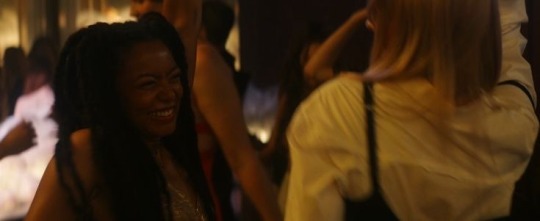
TLDR so u don’t have to read the whole thing; all of cate’s relationships with men are overall fake and do not revolve around love, rather the forging of an idealised identity formed around media (comphet Classic). cate’s only real raw genuine untainted relationship is with a woman. ft. mariecate
id love to my favourite hobby is looking at characters through a orangepinkwhite tinged lens. cate’s relationship with luke fits the comphet bill almost too well. firstly, cate being locked up her whole childhood means the formation of identity would be entirely based on media. a very heteronormative landscape of media, which aligns with traditional comphet. you could say her relationship with luke—literally golden boy—is comphet based, the ‘gold standard’ for a relationship cate’s drawn from all that she’s consumed in her childhood years. effectually, cate’s entire early life was robbed of her. and here, she achieves her perception’s ‘perfect’ idea of a life through luke, and forms her entire identity around him (hence her desperation to keep him). this is especially evident in the fact she changed her major to ‘hero management’ just to support luke’s career. to fully commit in shadowing him, for the rest of her life.
except, it’s fake. the entire relationship is fake. by the time of the show, cate has erased and changed and warped luke’s memory, his identity to the point where his mind breaks by the pilot. the fauxness and dysfunction of luke/cate’s relationship despite their image of unattainable perfection is probably her largest comphet indicator. maybe she loved him (not enough to remain faithful, however), but it reads as more of a subconscious love of what he represented, and something to anchor her identity to, which she’s never had a chance to form. as well as a means as to gain shetty’s affection and trust, no matter if she thought it was for his own good or not. her relationship with luke was poisoned, for a multitude of reasons.
(sidenote: cate/luke comphet reminds me of jiper comphet down to the false memories piper’s charmspeak and jason as the golden boy who literally explodes so like. there’s that’s free tidbit for anybody who is tapped the fuck in.)
cate has been so deprived of love she seeks it wherever she can find it. hence her stint with andre, which obviously ends in shambles because it’s foundations are already shaky, considering she’s cheating on luke with him, and andre is fucking his best friend’s girlfriend, but is also disingenuous, because cate’s compulsion powers arguably affect andre the secondmost to luke (though, by a wide margin). these are her two only romantic interests, and they suffer the worst consequences of it.
enter.. marie moreau. and cate’s relationship with marie is more genuine than any of her romantic relationships, which i think is the most telling thing. cate and marie serve as foils to each other: both in the manslaughter of their loved ones, the way shetty attempts to use them, and how can you NOT ship two reflections of each other?
in the finale, cate reaches out her hand, and andre can’t take it, because he doesn’t trust her. you can’t blame him. inversely, marie is the one always reaching out to cate, who is constantly defending cate’s intentions and her motivations to the others—when cate doesn’t deserve the benefit of doubt. partly, it’s because marie has known cate the least amount of time, making the betrayal sting the least. but also, cate’s relationship with marie is also the one least tainted by her compulsion powers; marie is the least affected by cate’s manipulations (to love her, to stay with her), and yet, despite marie not being compelled to do so; she still retains her faith in cate. that cate is good. that cate can be good, which is a fact not even cate believes in.
marie actively sees through cate’s compulsion, and later, nulls it. there’s a reason why marie is the one to discover cate’s betryal. there’s also a reason why marie is the one to blow cate’s arm off when saving jordan. in the same episode that cate reaches out and andre draws away, marie reaches out to cate, and cate draws away. that is a very direct comparison. it also speaks to cate’s larger unwillingness to accept love that is untainted, either fear she herself will ruin it, or because she doesn’t think she deserves it.
anyways, all this to say that yes, cate could totally be read as comphet. and mariecate is totally metal as they are, romantically involved or not.
#me after randomly inserting piper mclean comphet in there#yam thinks#gen v analysis#mariecate#catemarie#i’m only spitballing#lesbian cate all the way
121 notes
·
View notes
Text
WWDITS Managed The Impossible:
Queerbait with QUEER characters!?
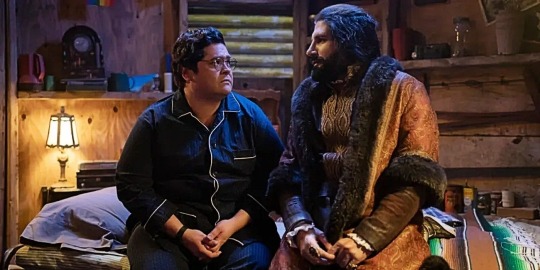
What a finale last night huh? While parts of it were enjoyable and funny, it's also hard to miss how incredibly shallow the whole thing feels. Let us explain!
First off, this show refuses to have a single emotional moments. People call it the "shit and fart" show for a reason. The earlier seasons left some room for emotional moments and development but the later seasons completely shit on any nice moment they have with a joke.
We get that the show's gimmick is that just like a sitcom, the vampires never change. And that really is an interesting concept! But in the finale they completely ignore a theme THEIR OWN SHOW SET UP! That the vampire did in fact change this time, just a little bit. And why did they change? Guillermo! Over six seasons we get to see how the vampires grow emotionally or explore new endeavors all because of Guillermo. But the finale completely writes that part away and decides that the vampires never changed, completely undoing six seasons of development.
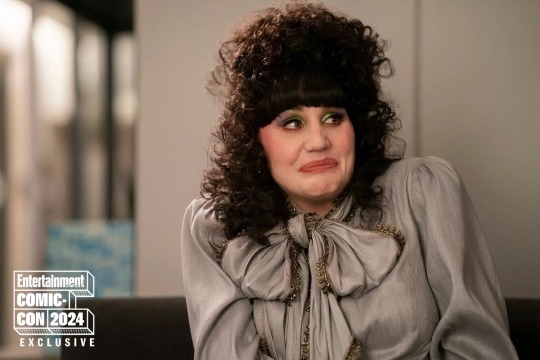
Now let's get to the thing that ticked us off the most. A show shouldn't be judged purely on whether its popular ship got together or not, but for this show that is a major valid criticism. It's not like the internet was being the internet and made up a random ship that made no sense, this ship had been hinted for YEARS! Despite its characters (both Nador and Guillermo) being canonically queer, their relationship follows that of classic queerbait beats. Theres just enough hints and breadcrumbs to keep the queer audience interested without ever having to even deliver on the queer aspects of the characters. This goes beyond Nandor and Guillermo as well! Ever seen Nadja or Laszlo have SERIOUS relationships with characters of the same sex? No! Anything remotely gay is played for laughs and not real representation. Some moments in the show showed care to its queerness. Guillermo's episode about coming out is great! But the show refuses to deliver on any of the queer plot lines it set up (honestly refuses to even wrap up any plot lines).
Now let's talk about those alternate endings. Honestly IMO the Nadja hypnosis with three alternate scenes in the reruns was genius! Very creative, but dear god did this fumble the bag. If they spent the rest of the season tying up loose threads then this would have been a fine concept. But what ends up happening is it's a non canon time waster in a finale that has too much to wrap up. It is quite literally, a waste of time. They needed to spend this time wrapping up arcs instead.
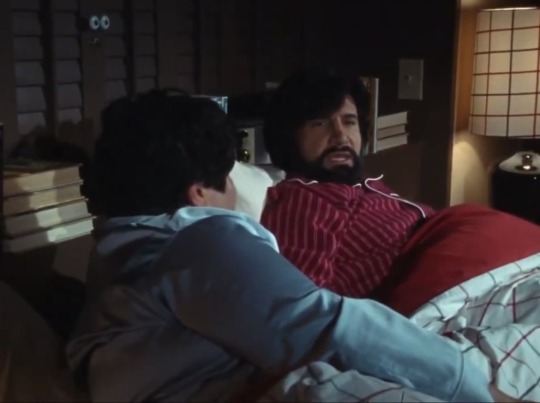
Theres also the case of the Nandermo scene. During the final alternate scene of the night we get to see human Nandor and Guillermo in one of the audience's "perfect endings". This is such a god damn slap in the face to anyone who cared about these characters. It is quite literally making fun of the audience (very Sherlock of you WWDITS). It's once again for the final time playing Nandermo (and queerness in general) for laughs. They're baiting the ship right in your face and telling you they think your idea is dumb. That it's a ridiculous joke. Ignoring the fact THEY ARE THE ONES WHO SET IT UP!!!
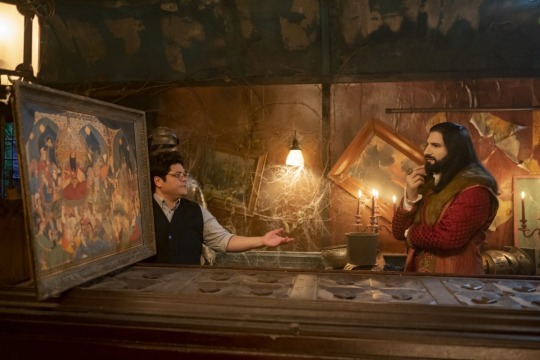
Then we also have the weird homophobic rhetoric from the cast and crew. In many interviews there have been statements where people say something like "it's important in this day and age to show that men can still be friends and not everything has to be sexual". Now one question; who the fuck said otherwise? Don't know if you've noticed but queer people are a MINORITY. Most men who know each other, are friends! There's gay men sure, but they're a minority. And this extends to fiction as well. Sure the internet will ship everyone, but an internet ship does not dictate canon. Theres not a lot of queer representation out there compared to all the cishet characters out there.
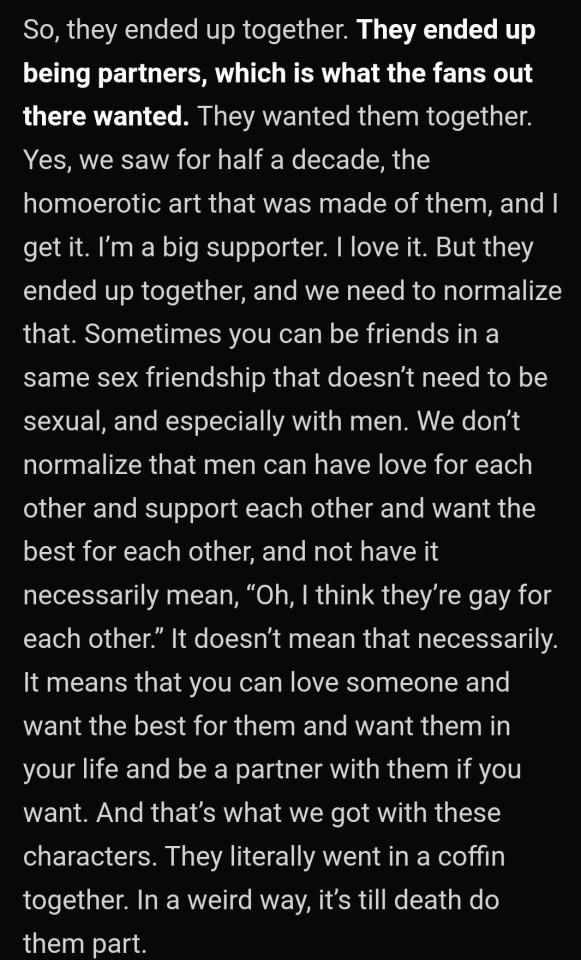
Frankly we have no idea where this rhetoric of men needing to prove they can just be friends came from. The exact same rhetoric is being used for Jayce and Viktor in Arcane as well. It just screams toxic masculinity not being able to handle being in queer spaces (fandom spaces (especially WWDITS and Arcane) tend to be quite queer leaning). Queer people want representation. That's why queerbait hurts so bad. You think you're finally seen only to be lied to and used for a profit. It's so incredibly disrespectful to the fans.
WWDITS really fumbled its last season and frankly has been going down hill for years. A great lesson on predatory ship baiting so bad it made its canonically queer characters into queerbait. That's genuinely fucking impressive in the worst way possible. Not to mention that random ass MAGA Guide thing (like wtf???).
Not even including the queer stuff this show just failed to wrap up any of its plot lines or give any emotional satisfaction to the viewer.
Anyway this finale really pissed us off, bye.
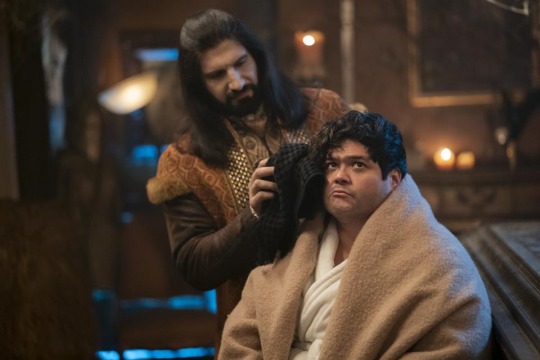
#WWDITS Spoilers#They went to town after that elevator ride IDFC#What We Do In The Shadows#WWDITS#Nandermo#Nandor The Relentless#Guillermo de la Cruz#Nadja of Antipaxos#Laszlo Cravensworth#Colin Robinson#The Guide#Queer#LGBTQ
85 notes
·
View notes
Text
i genuinely don’t understand how being afraid of GA’s reaction to buddie might be a reason for them not to become canon, just like being afraid of making them canon because they’d lose their will-they-won’t-they appeal. if you think about it, there’s actually a vacant spot for a gay couple on the show since michael and david left, and buck and tommy broke up. and also, after the bi-buck canonization, they did lose some of the audience, yes - but they also gained some. just look at how quickly people jumped on the bucktommy ship. and at least this time, with buddie, the ship would actually be worth it - it would be a beautiful relationship based on years of friendship and shared values, instead of whatever the shitshow bucktommy was
plus, i don’t see a problem with “suddenly making eddie gay,” because, first of all, they already gave one of their main characters a bi-awakening recently, and it went pretty well in terms of GA’s reaction. sure, there were some negative opinions, but overall GA accepted it, and it could’ve been way worse. which is a good thing - thank god society is more open-minded now than it was even ten years ago. secondly, they had michael realize his sexuality in his 50s, and tommy is another character who spent most of his life in the closet and was in a relationship with a woman before coming out. if they give depth to eddie’s gay awakening, i do believe the GA will get it. and yeah, maybe more people will fall out - but they’ll be replaced by a new audience who’ll be excited about a queer friends-to-lovers canonization
and lastly, yes, making eddie gay is “risky” because “there will be too many queer characters,” but also… considering how pointless and frustrating his relationships with women have been, and how - statistically - half of the main characters on the show are still canonically straight: bobby, athena, chimney, and maddie (we can headcanon all we want, but textually there’s not much to suggest most of them are queer). meanwhile, in eddie’s case, people can write entire essays on why he’s queer, using multiple moments from the show as evidence. it will make sense, if they handle it right
so if they make buddie canon, there would be two straight main pairings and two queer main pairings (one wlw and one mlm). that’s literally the perfect ratio for a major network tv show
and it’s just kind of funny how the writers or producers - or both - think that making buddie canon is some huge risk, but then they kill off the main character, who was also GA’s favorite, on a show that was known and loved for its found family trope and for keeping its characters alive - which is what set it apart from other procedural dramas. and it’s very funny to scroll through 911’s social media accounts, because the comments are just a complete mess. like kenny said, no one is happy. and no one cares about the new spinoff. if i were abc, i’d be so embarrassed. like, how do you mess it up this badly? and now they’re just ignoring the backlash and acting like it’s all fine. but every promo tactic feels awkward and fake because everyone is still running on disappointment and can’t fully believe in the show’s bright future anymore
honestly, the only way to save themselves is to bring bobby back (even if it’s ridiculous writing-wise) and make buddie canon in season 9 - not a season later. ’cause after everything they did with these characters in season 8, it would just be stupid and illogical for them not to end up together. again, it’s like if nick and jess or ross and rachel never kissed after all that romantic buildup. you can’t write two characters with textbook will-they-won’t-they energy and then never acknowledge it. i know it happened before with both straight and queer ships, but how long will this go on? when will they learn that it’s bad storytelling and frustrating for the audience?
and shutting buddie down once and for all won’t work at this point - it’s too late. if they both stay single forever or get into yet another flat and pointless relationships, it won’t land. hell, even if they do write good, interesting relationships for both of them, it’ll still feel disappointing, because buddie will forever be the ship that got away. it’s like if amy and jake married other people. or like robin and barney divorcing and ted and robin ending up together (some people liked it, sure, but most fans are still mad about that ending to this day)
and if bobby stays dead and buddie never happens, they’ll probably lose like… 80% of the audience. the only ones who’ll stay are the casual viewers who watch it in the background and don’t think too deeply about the story, and the die-hard fans who are too emotionally invested to quit. and that would go down as one of the stupidest acts of self-sabotage in tv history. but if they bring back bobby-peter and make buddie canon, it could actually become one of the most interesting, talked-about tv moments in a long time
so if i were abc, i’d be talking some serious sense into the writers and doing everything i could to save my ratings and my fanbase. because the marketing they’re using now won’t work in the long run
but only time will tell which direction this story takes
#buddie#evan buckley#eddie diaz#gay eddie diaz#buddie canon#bobby nash#anti bucktommy#911#911 abc#911 show#911 discourse#911 speculation#911 thoughts#i have to admit though - it’s definitely interesting to witness#i’m just hoping it gets a happy ending
49 notes
·
View notes
Text
can i say something absolutely insane. that will make you want to forcefully remove me from the kitchen. i think the jokes about cocaine usage are directly related to the subtextual presence of queerness in deadpool & wolverine
unless i'm missing more, there are two jokes about cocaine usage being forbidden in the movie. one, where it's said that it's the One Thing they're forbidden from doing, that They know all the slang terms for it so they can't slip through the cracks, and that wade wants to do it but isn't allowed. the next is when they meet johnny, wade says to chris evans, "fair warning, gorgeous, you’ll encounter some indelicate language, a smidge of assplay, but we’ve been PROHIBITED from using cocaine. (on camera)." okay? okay.
i don't think any good comedy is actually just a comedy, and if i'm good at anything it's stripping away the jokes and trying to make out what the writers are saying between all of the lines. in the case of deadpool & wolverine, i think it's about the relationship between the studio and the story, and the somewhat inherent tragedy of being a character that belongs to disney especially. this thing takes every chance it can to make fun of the mcu. one of its antagonists is a representation of the higherups, who choose to save the profitable stories, leave the rest to die, and then old yeller the profitable ones when they become too much trouble. the other antagonist is a story who was left to die. and all of this comes together to become a movie about a character who in real life had major elements of his character, his queerness, stripped and left to die when he became disney IP, finding out that his reality is about to be left to die and fighting to protect it.
i note his queerness there not only because it's the basis of this whole post but because the movie wants us to. this is, by far, the queerest deadpool movie so far. but you know what's interesting? there are people who watched it and came out thinking it was a Based breath of fresh air in this Woke Economy. we saw the allusions to sex scene tropes in the honda odyssey fight. they just saw a hypermasculine fight. because, ultimately, the queerness in this movie isn't profitable, so it's being muted and stripped and turned into jokes. god knows disney isn't going to let two of their most popular characters fuck nasty on the big screen. they're going to greenlight a deadpool movie and tell the writers that they can do whatever they want but to keep the queerness at arms length to avoid scaring away half the viewership. but we're telling a story about characters being left to die for not being profitable. so that really won't do. instead, we'll fill it with subtext and layer on jabs upon jabs at the studios who seek profit over a genuine story. and then we'll literally have our not-so-explicitly queer main character save his reality from being old yellered by holding hands with a shirtless man
tldr: it's the one thing they can't do! On camera.
156 notes
·
View notes